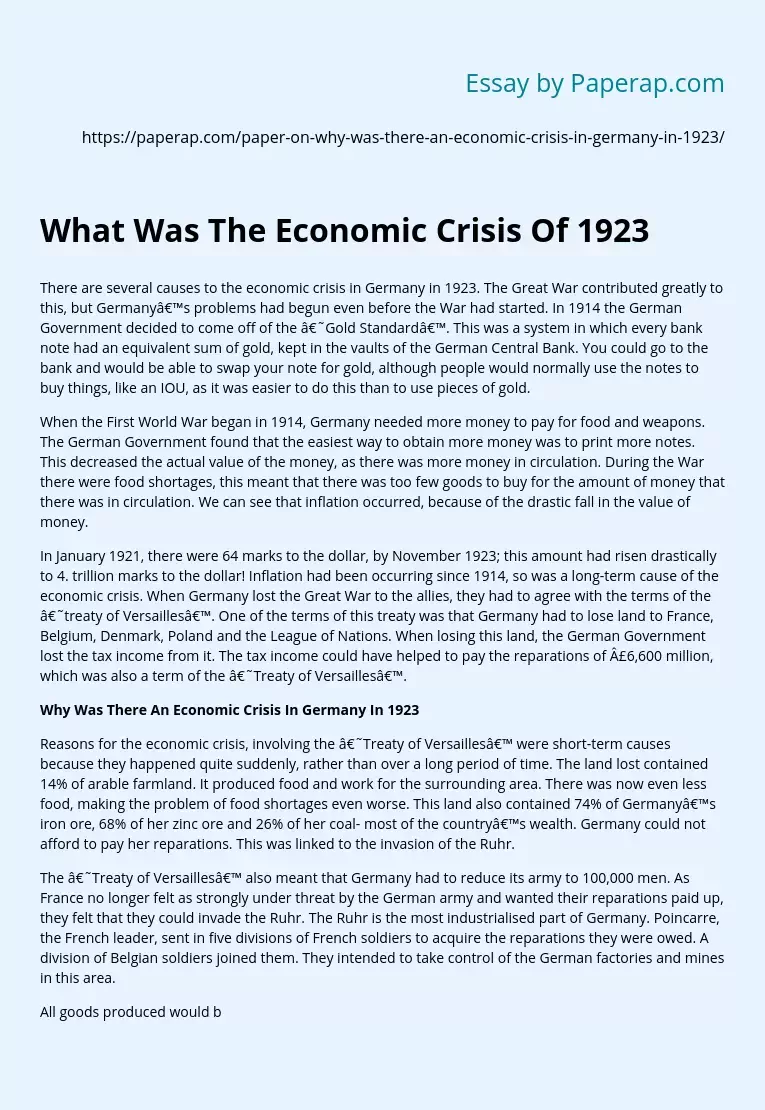There are several causes to the economic crisis in Germany in 1923. The Great War contributed greatly to this, but Germany’s problems had begun even before the War had started. In 1914 the German Government decided to come off of the ‘Gold Standard’. This was a system in which every bank note had an equivalent sum of gold, kept in the vaults of the German Central Bank. You could go to the bank and would be able to swap your note for gold, although people would normally use the notes to buy things, like an IOU, as it was easier to do this than to use pieces of gold.
When the First World War began in 1914, Germany needed more money to pay for food and weapons. The German Government found that the easiest way to obtain more money was to print more notes. This decreased the actual value of the money, as there was more money in circulation. During the War there were food shortages, this meant that there was too few goods to buy for the amount of money that there was in circulation.
We can see that inflation occurred, because of the drastic fall in the value of money.
In January 1921, there were 64 marks to the dollar, by November 1923; this amount had risen drastically to 4. trillion marks to the dollar! Inflation had been occurring since 1914, so was a long-term cause of the economic crisis. When Germany lost the Great War to the allies, they had to agree with the terms of the ‘treaty of Versailles’.
One of the terms of this treaty was that Germany had to lose land to France, Belgium, Denmark, Poland and the League of Nations. When losing this land, the German Government lost the tax income from it. The tax income could have helped to pay the reparations of £6,600 million, which was also a term of the ‘Treaty of Versailles’.
Why Was There An Economic Crisis In Germany In 1923
Reasons for the economic crisis, involving the ‘Treaty of Versailles’ were short-term causes because they happened quite suddenly, rather than over a long period of time. The land lost contained 14% of arable farmland. It produced food and work for the surrounding area. There was now even less food, making the problem of food shortages even worse. This land also contained 74% of Germany’s iron ore, 68% of her zinc ore and 26% of her coal- most of the country’s wealth. Germany could not afford to pay her reparations. This was linked to the invasion of the Ruhr.
The ‘Treaty of Versailles’ also meant that Germany had to reduce its army to 100,000 men. As France no longer felt as strongly under threat by the German army and wanted their reparations paid up, they felt that they could invade the Ruhr. The Ruhr is the most industrialised part of Germany. Poincarre, the French leader, sent in five divisions of French soldiers to acquire the reparations they were owed. A division of Belgian soldiers joined them. They intended to take control of the German factories and mines in this area.
All goods produced would be shipped off to France, until the reparations owed to the French were paid. This was a short-term cause to the economic crisis, as it only happened over a matter of days and weeks, unlike inflation, which was occurring for years. Germany could do nothing to stop this. This made Germany very ashamed, especially after losing the War and having to agree with the terms of the ‘Treaty of Versailles’ as well. The Government ordered passive resistance. The French had no one to work for them as the Ruhr workers’ were ordered to go on strike.
They were ordered to refuse to co-operate with the occupiers. The French then kicked 150,000 German workers out of the Ruhr. They fled as refugees. This produced yet another problem for the already suffering Government and people of Germany. How could they afford to feed, clothe and house the refugees? All their money was already being used to pay reparations, how could they afford this? These problems were solved, but by causing another problem. It seemed that the only way to overcome the problem of the refugees was to print more money.
The money in circulation now was growing greatly and the cost of living was increasing. The economic crisis was a vicious circle, by solving one problem they were creating another. It seemed as though it was never going to end. Although there were many causes for the economic crisis, I believe that one made a bigger impact than the others. The Great War, the costs of which were astronomical, both during and after. The War increased the effect of inflation, as the Government printed more notes to try and cope with the problems the War was bringing, therefore decreasing the value and making problems worse.
After the War, the ‘Treaty of Versailles’ produced many difficulties. All of the problems caused by this linked with each other and then back to inflation. The German economic crisis was inevitable because the Government did not know that coming off of the ‘Gold Standard’ would cause inflation- it was going to happen, they thought it would be better, not worse. They could not have prevented the ‘Treaty of Versailles’ as they lost the War. They didn’t purposely lose the War to cause themselves problems,the problems were inevitable. The economic crisis was waiting to happen, Germany could not have stopped it!
What Was The Economic Crisis Of 1923. (2019, Dec 05). Retrieved from https://paperap.com/paper-on-why-was-there-an-economic-crisis-in-germany-in-1923/

